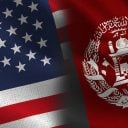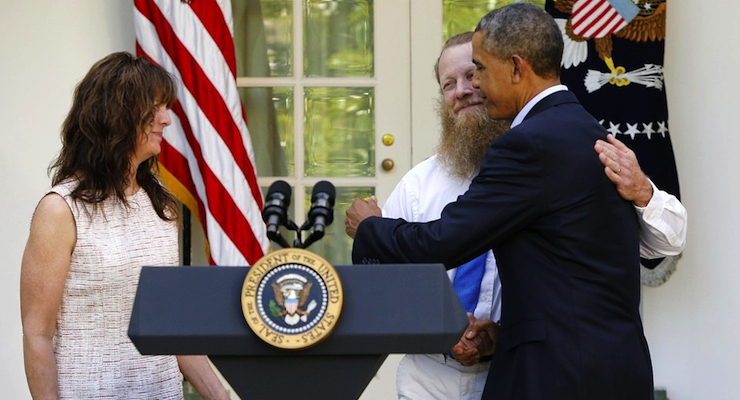

President Obama hugs the father of U.S. Army Sgt. Bowe Bergdahl, a known deserter now charged with that and more under the UCMJ, after delivering a statement on their son’s swap for the notorious Taliban Five.
The White House on Wednesday will release its review of U.S. policy that will recommend allowing ransoms to be paid by the families of American hostages. PPD has confirmed that President Obama will change longstanding U.S. policy and allow the families to pay ransoms without fear of prosecution.
President Obama ordered the review following the deaths of several Americans held by Islamic State militants. However, the president will announce this policy change despite the law remaining the same and the data not in support of his decision.
While some families complained about their dealings with the government, including threats of prosecution if they paid ransom to secure their loved ones’ release, the president’s scapegoating of U.S. policy doesn’t do much to solve the problem.
First, the recent executions of journalists James Foley and Steven Sotloff were unlikely to be avoided even if the families were allowed to negotiate a ransom for their release. According to a recent study by PPD, even when families in fact did negotiate for their loved ones’ release regardless of threats, there was little impact. Unfortunately, the goal of these two kidnappings was terror, not money. The Islamic State, unlike other terror organizations such as the Haqqani Network, a Taliban- and al Qaeda-linked group that held deserter and Army Sgt. Bowe Bergdahl, does not generate their money from kidnappings.
Further, our investigation of available data found paying ransoms to Islamic radicals holding Western hostages merely increases both kidnappings and death rates, rather than having the intended effect of saving lives. Kidnapping Europeans for ransom, on the other hand, has become a global enterprise for al Qaeda, Boko Haram, al Shabaab, the Taliban (particularly the Haqqani Network), and other Islamic radical groups seeking to bankroll both established and new terror groups, as well as operations worldwide.
Most European governments deny paying ransoms, but according to the U.S. Treasury Department, from 2008 to 2014 roughly $165 million has been paid to al Qaeda and its affiliates. The predominant problem with this policy, which they repeatedly deny engaging in, is that it only leads to more kidnappings and there is no evidence to suggest that it reduces the lives lost in a participating country. Although the data (courtesy of the NYT) below needs updating, it illustrates the argument.
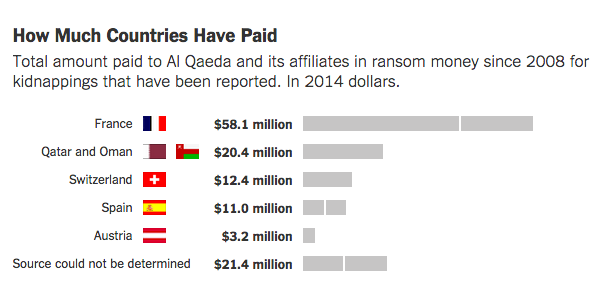
As we can clearly see from the tragic policy adopted by France, the Western European country has ended up paying the most in kidnapping ransoms to terror groups — by far. But, as we can see from the data below, it only results in a higher number of citizens targeted for kidnapping, and are consequently killed because of the obvious and not-so obvious risks of being in captivity.

France far and away has the largest number of hostages killed in captivity, either by their captors or from some other condition. The United States, on the other hand, which had zero citizens released for ransom, has not been a particularly attractive target for radical Islamic groups.
Yet, despite how convincing those two graphs may be, even they are somewhat misleading. It is very important to remember that the U.S has a significantly higher population than the other countries on the list, a factor that must be controlled for along with travel to high-risk regions. In fact, from 2008 to 2014, while President Obama largely adhered to the long-standing policy, there wasn’t a single American killed by captors and only 3 kidnappings for a country home to over 300 million.
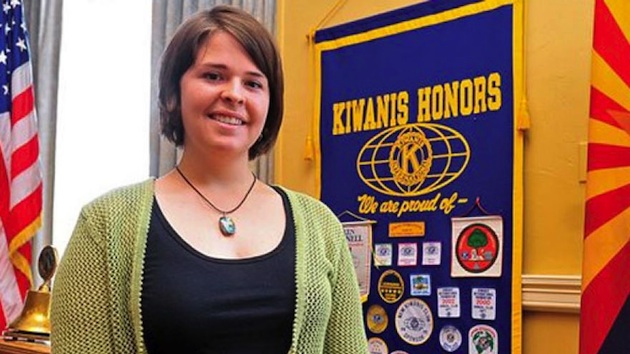
In this May 30, 2013, photo, Kayla Mueller is shown after speaking to a group in Prescott, Ariz. (AP/The Daily Courier)
In fact, America did not suffer a somewhat comparable hostage fatality until the case of Kayla Mueller, the female aide worker who died while in ISIS captivity. The Islamic State claimed to the family that Kayla was killed by a coalition airstrike, but counter-terror experts believe that she, too, was initially captured for terror purposes, not for the $6.2 million ransom payment they demanded from the family.
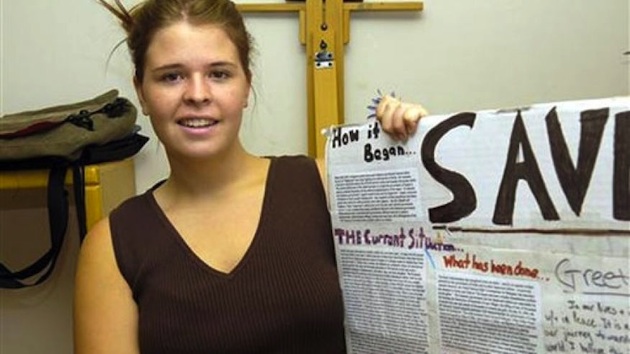
Kayla Mueller (AP/The Daily Courier)
In fairness, we will never know for sure if they concocted the story to allude American outrage and retribution. But what we do know is that the president’s decision to break with another longstanding American policy — to not negotiate with terrorists — contributed significantly to Kayla’s demise.
The Mueller family said that the Obama administration’s swap of the Taliban Five held at Guantanamo Bay for Army deserter Bowe Bergdahl doomed any hope to work out a deal with ISIS to get Ms. Mueller back.
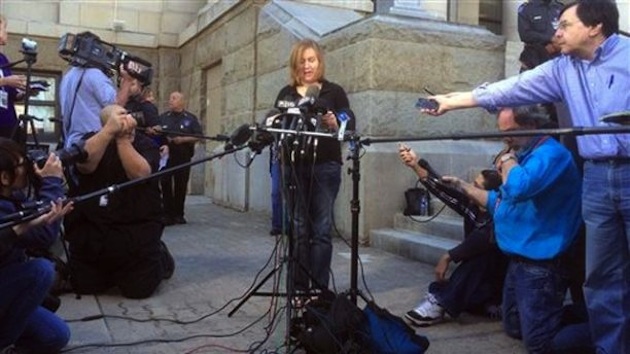
Kayla Mueller’s mother gives a press conference in Arizona. (Photo: Video Screenshot)
Carl Mueller, the father, told NBC in a February interview that after the White House agreed last year to swap Bergdahl, who was captured and held for five years after he deserted his unit on June 30 of 2009, ISIS raised the ransom for their daughter.
“That made the whole situation worse,” Kayla Mueller’s brother, Eric, told the network. “Because that’s when the demands got greater. They got larger. They realized that they had something. They realized that, ‘Well, if they’re gonna let five people go for one person, why won’t they do this? Or why won’t they do that?’”
A senior administration official would not confirm that policy change, but said the review would be made public Wednesday. The official insisted on anonymity because they were not authorized to discuss the review publicly by name.



